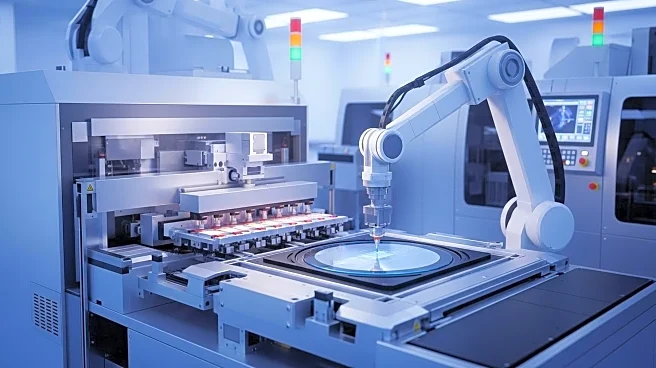What is the story about?
What's Happening?
The Trump administration is urging Taiwan Semiconductor Manufacturing Company (TSMC) to relocate 50% of its semiconductor production to the United States. This move is part of a broader strategy to enhance American supply-chain security and reduce reliance on foreign chip manufacturing. Commerce Secretary Howard Lutnick has been at the forefront of these discussions, emphasizing the importance of this shift for national security. The administration has proposed a '1:1' production rule, which would require companies to manufacture domestically as many chips as they import. This initiative is seen as a response to geopolitical tensions, particularly concerning China's claims over Taiwan. TSMC has already committed to investing $100 billion in U.S. chip plants, but the complexity of the semiconductor supply chain poses significant challenges to this relocation effort.
Why It's Important?
The push for domestic semiconductor production is crucial for the U.S. to maintain technological and economic independence. Semiconductors are vital components in various industries, including defense, automotive, and consumer electronics. By increasing domestic production, the U.S. aims to safeguard its supply chain from potential disruptions due to geopolitical conflicts. However, the relocation of such a complex supply chain involves significant logistical and financial challenges. The U.S. currently produces less than 10% of the global chip supply, highlighting the scale of the task ahead. The proposed tariffs and production mandates could also impact global tech firms and potentially lead to retaliatory measures from other countries, particularly China.
What's Next?
The success of this initiative depends on the ability to persuade not only TSMC but also its vast network of suppliers to relocate to the U.S. This process is expected to take several years, if not decades, given the intricate nature of semiconductor manufacturing. The administration's aggressive trade policies may face resistance from both domestic and international stakeholders. Taiwan, in particular, has expressed concerns about the feasibility of such a move, given its established role in the global semiconductor market. The outcome of these negotiations will significantly impact the future of the semiconductor industry and U.S.-Taiwan relations.















